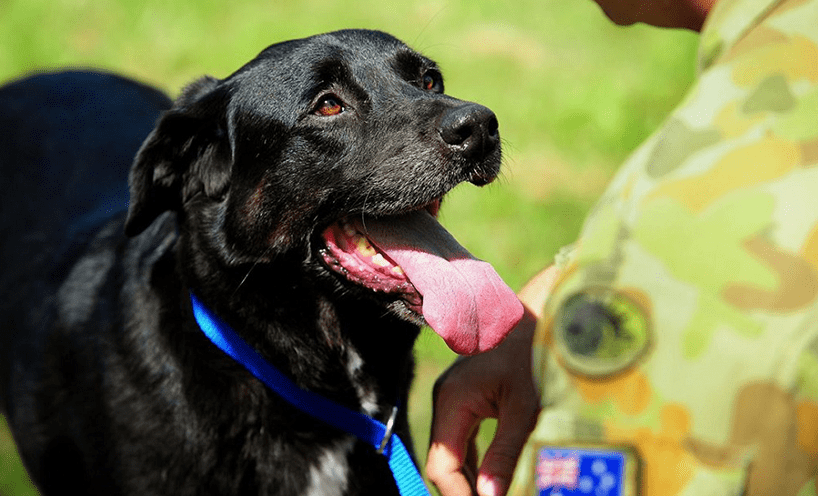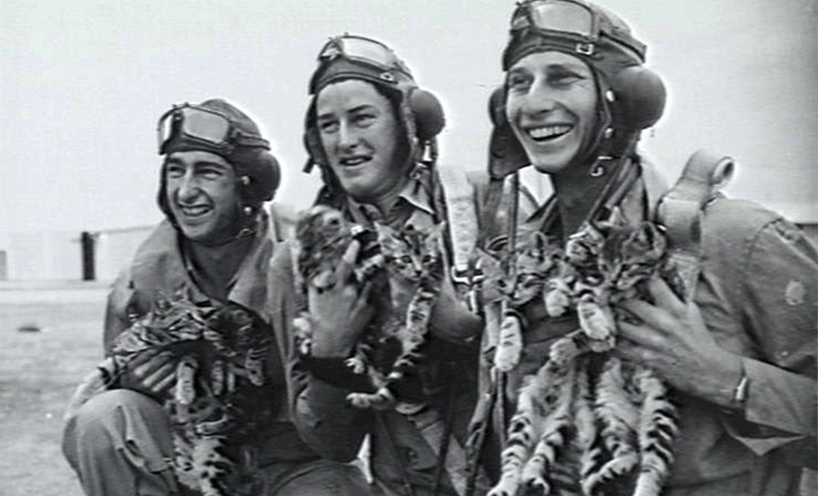- Published:
- Tuesday 14 February 2023 at 2:55 pm
Following War Animal Remembrance Day on Friday 24 February, the Shrine will for the first time conduct a dedicated Last Post Service commemorating the role of animals in defence. This special service will be attended by a variety of organisations including the Victoria Police Mounted Branch, Defence Community Dogs, Integra Dogs and pigeon handlers. Members of the public and their furry (leashed) friends are encouraged to attend the service.
Beyond the often fabled stories of their incredible feats during times of war, animals also play a crucial role in supporting veterans back at home. Community organisations such as Defence Community Dogs, who support prisoners to train rescue or re-homed dogs as assistance animals for veterans, are changing the lives of both veterans and animals in need. ADF Veteran, Thomas, credits meeting his assistance dog, Bruce, with completely turning his life around after injuries left him unable to serve.
"Receiving Bruce has almost definitely saved my life. Now I have a full-time job. I've completed a university degree. Life is only getting started. Bruce provided me with an anchor when I didn't really know what was coming next. Things were made infinitely easier having the right companion with me. That source of reliable and constant support. Never judging. Bruce just knows empathy. He's incredibly perceptive. He knows your emotions before you do."
This is also a time to remember all of the animals displaced and left behind when conflicts break out. Nigel Allsopp, CEO of the Australian War Animal Memorial Organisation (AWAMO), has recently returned from Ukraine where he witnessed abandoned and malnourished animals on the streets, animals starving and dying in farms and zoos, and crowded animal shelters strapped for supplies.
Allsopp says:
“Many dogs and cats were abandoned by families forced to leave their homes. These pets would probably have died from starvation, if not for the kindness of the local soldiers who provide food, care and shelter.”
Throughout history Australian armed forces have employed horses, donkeys, mules, camels and oxen to transport troops, weapons, stores and equipment. While the donkey made famous by ‘Simpson’ at Anzac Cove is perhaps the best-known example, animals were in constant demand to carry supplies to the front
line.
In the First World War, canaries alerted troops in the trenches to the presence of poisonous gas. Pigeons have carried vital signals and messages from frontline troops to rear echelons, and from spies behind enemy lines.
Today, dogs continue to locate and rescue lost personnel and materiel, detect mines, track fugitives, and guard navy, land and air bases. Cats meanwhile control pests onboard vessels, in storerooms, and on bases.
A variety of animals have served as ship, regiment, and squadron mascots—common pets such as dogs and cats and exotic creatures like monkeys, kangaroos or falcons provided companionship and comfort for servicemen and women far from home.
Shrine of Remembrance CEO Dean Lee says:
“Even in war the bonds between humans and animals endure. They protect us, guide us and remind us that we are loved. In this service we seek to honour all war animals with warmth and respect for all they have done for us.”
KEY PROGRAM DETAILS
Support War Animal Remembrance Day by:
- Attending the War Animal Remembrance Day Last Post Service on Sunday 26 February with your furry (leashed) friend.
- Purchasing a purple poppy item from the Shrine Shop. All proceeds support AWAMO.
- Attending a free screening of film ‘The Waler’ about Australia’s great war horses at the Shrine on War Animal Remembrance Day, Friday 24 February.
MEDIA ENQUIRIES
Photo and interview opps available leading up to War Animal Remembrance Day
For more information or to request an interview with Nigel Allsopp, CEO – AWAMO, Shrine representatives or veterans and their assistance animals please contact: Terri King at Pitch on terri@pitchprojects.com or 0488 036 740.
Images for media use are available here.
Credit/captions for images displayed above:
1) Cressy, Vic. 1943-03-24. Three Sergeant Pilots Of The Royal Australian Air Force (RAAF) Relaxing Between Flights, Nursing The Numerous Station Kittens, image courtesy of the Australian War Memorial
2) Sarbi, the Special Operations Explosive Detection Dog (EDD), image courtesy of the Department of Defence
Video interview footage of ex-Navy veteran Michael with assiatnce dog Lola here (courtesy Defence Community Dogs) available here.
Updated

